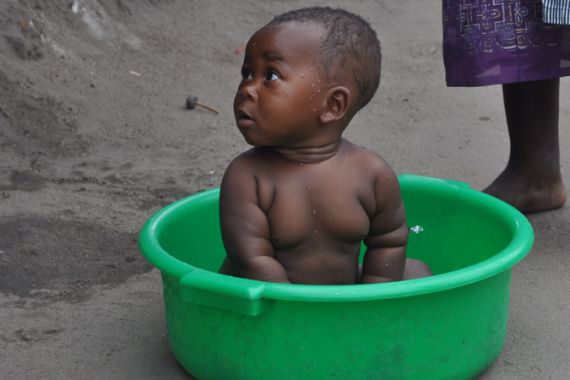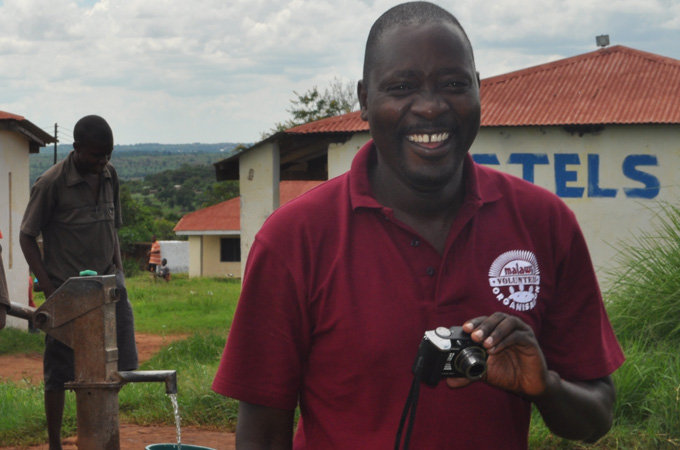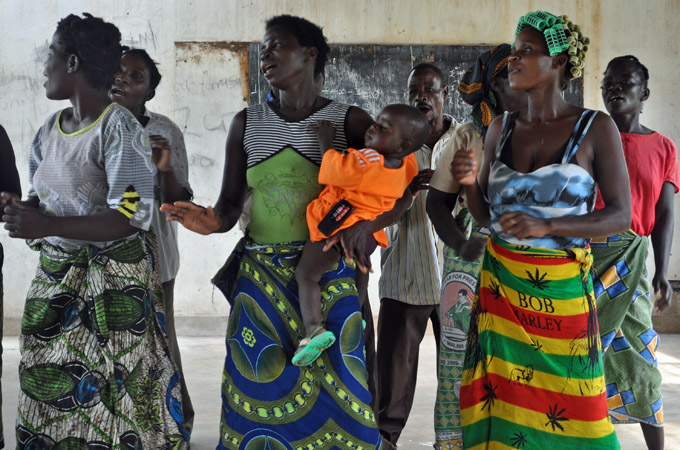A journey through Malawi
Tales of hope and compassion in the face of adversity.

 |
| Tamsei, who is himself an orphan, takes care of the children at the orphanage [Hend Krichen] |
Tamsei – the teaching assistant
Tamsei is a 21-year-old assistant teacher at Msumbi orphanage in Malawi. He looks after around 60 children aged between two and five. His role is, in fact, more like that of a caretaker than a teacher and includes cooking the children’s breakfast, taking them to the bathroom and keeping them entertained with games and stories.
Tamsei is a gifted artist but cannot afford the most basic equipment needed to pursue his passion – something he has sacrificed in order to make a difference in his community.
While the relationship between the children and some of their other carers is built more upon discipline and respect, Tamsei has come to represent compassion and love. In this case, the relationship between carer and cared-for is built upon understanding – because Tamsei himself is an orphan. When he lost his parents, there were no orphanages in his village so he went to live with his grandparents.
It is not unusual for children in rural areas to be cared for by members of their extended family. Despite the grinding poverty, there is a strong sense of community spirit that crosses generations. This is evident every day when some of the older girls take it in turns to carry Blessings, the youngest of the orphans, to and from the orphanage. The entire community behaves as one large, all-encompassing family – seeming to epitomise the phrase often used to describe Malawi: ‘the warm heart of Africa’.
 |
| Four-year-old orphan Edward is one of the oldest children to attend the orphanage [Hend Krichen] |
Edward – the orphan
Four-year-old Edward is one of the oldest children at the orphanage. Bright and inquisitive, he was always the first to volunteer to reel off the letters of the alphabet or the days of the week.
His daily routine was much the same as many of the other children. He would wake up early to help his grandmother and then walk to the orphanage carrying some of the wood he had collected for the fire. Always the first to arrive, he would immediately run over to a pile of old and broken toys to stake his claim on the bicycle with no seat, which he would then pretend to ride. As his teacher started to prepare the morning porridge, Edward would lead the other children in clearing the area of rubbish. This would be followed by morning prayers and lessons, during which the children would enter into their familiar routine of singing songs, repeating the months of the year and days of the week and reciting the alphabet.
After a couple of hours of this, the children would be sent to collect their plates of porridge, but there was often too little food for all the mouths the orphanage had to feed. As the oldest, Edward often had to scrape the leftovers from the bottom of the pot so that he might eat. This he did without complaint so that the other children might enjoy a full meal.
While we were there, we witnessed Edward take a new child under his wing. While some of the other children isolated and ignored Shariff, sometimes stealing his food, Edward befriended him – introducing him to his friends and sitting with him in class. One day, as Shariff sat crying in the corner after some of the other children had stolen his food, Edward consoled him, offering up his own plate of porridge.
Despite his abundant enthusiasm for learning, Edward is drastically underprepared for the next stage of his education. The orphanage provides his only source of stimulation, but even the most basic of learning materials, like pencils and paper, are missing.
 |
| Project coordinator Harry believes in tackling adversity head on [Hend Krichen] |
Harry – the project coordinator
Harry is the project coordinator at the Malawi Volunteer Organisation. One of the few from his community to have achieved a level of higher education, Harry obtained a degree in Mechanical Engineering from Lilongwe University before returning to his childhood home of Monkey Bay.
Harry can not only explain some of the shocking statistics that describe his country – like the fact that the average life expectancy is just 39 years – he can illustrate them with plenty of examples from his own life. He has lost many friends and relatives to HIV/AIDS, including his cousin during our visit, among other diseases. He explains that around 65 per cent of rural Malawians live in dire poverty, earning less than a dollar a day, while one-in-five children are likely to die of disease (mainly Malaria) or malnutrition before the age of five.
The majority of Malawians work as farmers. However, a fifth of Malawi is taken up by Lake Malawi and only half of the country’s land is appropriate for agricultural farming. A growing population is placing a great strain on this limited land.
Harry returned to his rural hometown of Monkey Bay in a bid to make a difference and give something back to the community there. With the help of one of his friends, Francis, he set up a number of programmes that allow volunteers from across the world to travel to Malawi to provide aid. One of the programmes consists of a series of short classes that educate villagers about how different diseases are contracted and the importance of good hygiene to disease prevention. As well as educating the adults, he has created orphanages that provide day care for young children.
“By facing adversity head on, we are providing a … future for the people and providing hope, no matter how small,” Harry explained. “They truly believed that we were the only people that could change our lives.”
 |
| Villagers spread the word about HIV/AIDS via song and dance [Hend Krichen] |
HIV-infected villagers
Some of the HIV infected locals use song and dance to teach villagers about the disease and to dispel some of the stigma attached to it. Singing in Chichewa to a beat provided by foot stamping and hand clapping, they share messages about living with the disease. This progresses into advice about how to avoid contracting it and the importance of being tested. One of the women later explained that she, her husband and her three-year-old son were living with the disease. Many of them expressed the opinion that if change was to happen within their community, it would have to begin with them.